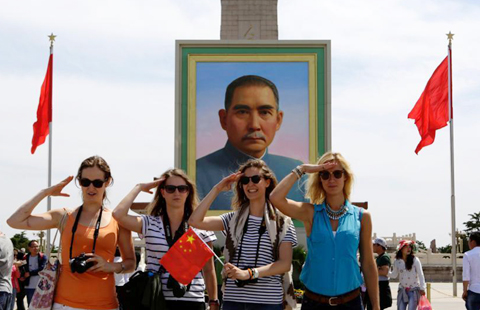Promote competition to end taxi monopoly
Updated: 2015-05-05 16:22
By Li Yang(chinadaily.com.cn)
|
||||||||
Authorities should reflect on why the Uber app, which allows customers to submit a trip request to crowd-sourced taxi drivers, has become so popular in Chinese cities, rather than simply punishing the drivers, says an article from the Beijing News. Excerpts:
Uber is a US company headquartered in San Francisco. It develops, sells and runs a mobile-app-based transportation network. As of March, the Uber app service was available in more than 200 cities in 55 countries in the world.
The fast growth of Uber in Chinese cities indicates that China’s taxi industry cannot meet the demands of customers. The taxi business is largely a monopoly with entrenched vested interests, and operates in a manner that lacks transparency and supervision.
Punishing Uber drivers without implementing the overdue reform of the taxi industry, which fattens a few and exploits hundreds of thousands of taxi drivers, is to side with taxi business owners.
For more than two decades, the population of urban residents has almost doubled, but the number of taxis is strictly controlled, and remains almost unchanged. The rent each driver pays every month varies year by year. But the industry management has never disclosed how the money, called administration fees, is used.
The fast growth of Uber shows the strong demand of the rising middle class in China. They can afford to pay a higher price than what taxis charge, and they enjoy the convenience. The development and spread of mobile Internet technology bridged the gap between the drivers and the consumers.
Authorities need to face up to the fact that if the reform of the taxi industry cannot catch up with the changes of the market, it is better to strengthen the regulation of Uber, instead of simply labeling the Uber service illegal.
Safety is a big concern for Uber customers. And the law forbidding private cars to operate for hire should be revised to clarify the liabilities among the Uber service company, drivers and customers, and should grant private car drivers the freedom to earn money with their cars under certain conditions.
The Internet makes many previously impossible things possible today. The Uber service promotes a more efficient use of resources.
Competition will hasten the changes to the lackluster taxi industry, and benefit consumers. To some extent, the rise of Uber is not only a reflection of the urban transportation market, but also the growth of the middle class. They are both the drivers and the consumers. They not only have the money, but also the technological means to seek more benefits from their wealth.

 Ten photos you don't wanna miss - May 5
Ten photos you don't wanna miss - May 5
 Met Gala 2015 highlights Chinese influence on fashion
Met Gala 2015 highlights Chinese influence on fashion
 Six reasons stopping Apple Watch from ticking in China
Six reasons stopping Apple Watch from ticking in China
 Historical photos of 56 nations in China (Part I)
Historical photos of 56 nations in China (Part I)
 World No.1 Ma wins first men's singles world championship
World No.1 Ma wins first men's singles world championship
 Ten photos you don't wanna miss during May Day holiday
Ten photos you don't wanna miss during May Day holiday
 The world in photos: April 27 - May 3
The world in photos: April 27 - May 3
 Fans dressed up to celebrate 'Star Wars Day' in Budapest
Fans dressed up to celebrate 'Star Wars Day' in Budapest
Most Viewed
Editor's Picks

|

|

|

|

|

|
Today's Top News
Xi will honor soldiers during Russia trip
Shanghai bans families of govt officials from owning firms
Chinese companies demonstrate presence at OTC
Most Americans believe US wealth distribution unfair: poll
Xi, Eric Chu
stress shared destiny
New leaders take reins at oil giants
China protests
US blacklisting in religious freedom
China becomes top source of immigrants to United States
US Weekly

|

|






